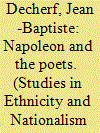|
|
|
Sort Order |
|
|
|
Items / Page
|
|
|
|
|
|
|
| Srl | Item |
| 1 |
ID:
092948


|
|
|
|
|
| Publication |
2009.
|
| Summary/Abstract |
The patronage system at the Mughal court drew many Safavid poets and men of learning to India who interacted with Indians at various levels. In an unusual case, the young Iranian poet 'Urf?'s attachment to his patron, Prince Sal?m (later Emperor Jah ng?r), was interpreted by some as more than merely professional and the poet's death at a young age gave rise to speculations of intrigue. Mughal princesses were also actively involved in the literary scene of the time. In another instance, the association of Princess Z?bunnisa, daughter of the Emperor Awrangz?b, with Persian poets was sometimes personal, leading to gossip and scandal about her. It turns out that in both cases stories about the sexual aspects of the relationships between Mughal patrons and Iranian poets arose in the eighteenth century and are more reflective of the concerns of the literary culture of that period. This paper explores the power and gender dynamics of these poet-patron relationships in the context of the general Iranian-Indian tension at the Mughal court and a highly developed and creative tradition of crafting biographical accounts.
|
|
|
|
|
|
|
|
|
|
|
|
|
|
|
|
| 2 |
ID:
101238


|
|
|
|
|
| Publication |
2010.
|
| Summary/Abstract |
Brajbhasha literature is a domain of Mughal culture seldom investigated by scholars, to the detriment of our understanding of both. While the Mughal court is famed for its lavish support of Persian writers, a surprising number of Brajbhasha poets also attracted the notice of Mughal patrons. In this paper I look at the lives and texts of important Braj writers who worked in Mughal settings, with a view to uncovering the nature of the social, political and cultural interactions that this kind of patronage represents. Why these poets have been largely lost to social and literary history is another concern, along with the challenges of trying to recover their stories.
|
|
|
|
|
|
|
|
|
|
|
|
|
|
|
|
| 3 |
ID:
104192


|
|
|
|
|
| Publication |
2010.
|
| Summary/Abstract |
The legend of Napoleon has been widely studied by historians; however, little has been written analysing the ways in which this legend brings something new to the history of political ideas. The poets who yielded to a fascination with the dead emperor offered him 'acceptance by his peers', thus creating a typically Romantic new conception of the great man. But Napoleon, as presented by many of the great Romantic writers, was also the object of an extraordinary collective love and enthusiasm. He was, in the words of Balzac, 'the god of the people' (1935, vol. 8: 448). In other words, what is new, in the poets' idealised memory of Napoleon, is the idea of 'extraordinary domination' (Weber), a domination whose mainspring is radically different from that of conventional domination.
|
|
|
|
|
|
|
|
|
|
|
|
|
|
|
|
| 4 |
ID:
101021


|
|
|
|
|
| Publication |
2010.
|
| Summary/Abstract |
The connection between proverbs and poetry is a profound and ancient one. The classical poets often cited well-known proverbs to attract and engage common people. In the case of legendary poets, some of their enchanting poems were well received and commonly repeated by ordinary people and gradually became famous proverbs themselves. More than any other Persian poets, Rumi, Saacutedi and Ferdowsi cited and created proverbs. Due to the condensed structure of maxims, often the preconditions and teachings of poets became distorted. As shown here, even the logical and philosophical views of Rumi and Khayyam were not spared. This is a common phenomenon in all languages, but can be reversed by finding their poetic roots and rediscovering the lost lessons of master poets. Nevertheless, the majority of proverbs are created by rural people to share, reason, and transfer their everyday life experiences to their children, one another and future generations.
|
|
|
|
|
|
|
|
|
|
|
|
|
|
|
|
| 5 |
ID:
084357


|
|
|
|
|
|
|
|